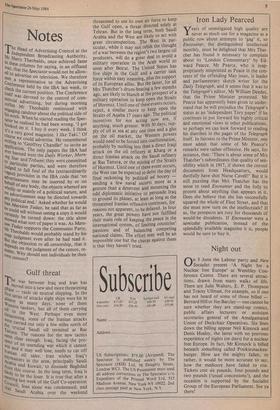Gulf threat
The war between Iraq and Iran has Phase moved into a new and more threatening r ase — raids on neutral shipping. In. the iirst series of attacks eight ships were hit in avvIll°st as many days, none of them oestern tankers, but all of them carrying tt:' to the West. Perhaps even more wureatenirig, some of the Iranian attacks the carried out only a few miles north of c crucial Saudi oil terminal at Ras Tanura, The reasons for the new tactics to clear enough. Iraq, facing the pro- sPe. ct of an unending war which it cannot Ivul .and it may well lose, needs to cut of _raolan oil sales. Iran wishes Iraq's . PAraYmasters in the area, principally Saudi f, abla and Kuwait, to dissuade Baghdad ti'i.z°111 this course. In the long term, Iraq Is h.,„elY. to be the loser. It is true that after a -reting last week of the Gulf Co-operation th°11ficil, Iran alone was condemned, and
at Saudi Arabia over the weekend
threatened to use its own air force to keep the Gulf open, a threat directed solely at Tehran. But in the long term, both Saudi Arabia and the West are likely to act with great circumspection. The West in par- ticular, while it may not relish the thought of a war between the region's two largest oil producers, will do a great deal to avoid a military operation in the Arab world so soon after Beirut. The United States has five ships in the Gulf and a carrier task force within easy steaming, plus the support of its European allies. But the latter, for all Mrs Thatcher's drum-beating a few months ago, are likely to blanch at the prospect of a military operation to keep open the Straits of Hormuz. Until one of these events occurs, reject, a similar move to keep open the Straits of Aqaba 17 years ago. The political incentives for not acting now are, if anything, much greater. With 30 days, sup- ply of oil at sea at any one time and a glut on the oil market, the Western powers would need to be forced into confrontation, probably by nothing less than a direct Iraqi attack on the oil refinery at Kharg or a direct Iranian attack on the Saudi refinery at Ras Tanura, or the mining of the Straits of Hormuz. Until one of these event occurs, the West can be expected to defer the day of final reckoning by political ad hocery sending a few naval escorts more as a gesture than a deterrent and mounting the odd diplomatic initiative to persuade Iraq to ground its planes, at least as long as the threatened Iranian offensive continues, for reasons not apparent, to be delayed. In four years, the great powers have not fulfilled their main role of keeping the peace in the international system, of limiting countries' passions and of balancing competing national claims. The effort may well be an impossible one but the charge against them is that they haven't tried.














































 Previous page
Previous page